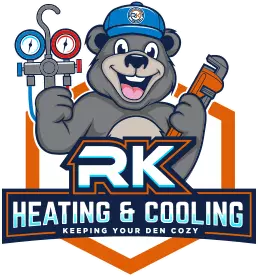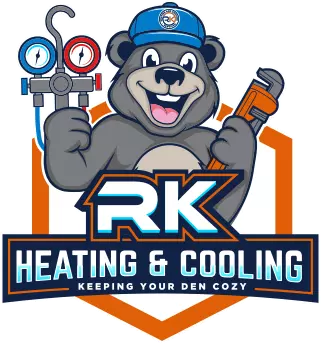HVAC systems are an essential part of maintaining a comfortable home environment. They provide the necessary heating, ventilation, and air conditioning to ensure that indoor air quality remains high. However, there are times when these systems can emit unpleasant odors, disrupting the comfort they are supposed to provide. In St. Louis, many residents face this issue, especially as the seasons change and systems are used more frequently. Addressing these bad smells promptly is crucial to maintaining a pleasant home atmosphere and ensuring the HVAC system operates efficiently.
Bad odors from an HVAC system are not only inconvenient but can also indicate underlying problems that require attention. Whether it’s the smell of mold, burning, or something else, these odors can affect your home’s air quality and even signal potential hazards. By understanding common causes and taking proactive steps to address them, homeowners can ensure their HVAC systems continue to function smoothly and provide clean, fresh air.
Common Causes of Bad HVAC Smells
1. Accumulation of Dust and Debris:
Over time, dust and debris can collect within the HVAC system, leading to a musty odor. This is often due to dirty air filters that need replacement. When filters are clogged, not only does it block the airflow, but it also allows dust to settle throughout the system. Homeowners should regularly check their filters and replace them every few months to prevent such build-up.
2. Mold or Mildew Growth:
A damp or earthy smell might mean that mold or mildew is present in the system. This can occur when moisture accumulates in the system’s ducts or other components, creating a breeding ground for mold. Maintaining the humidity level in your home and ensuring the HVAC system is free of leaks can help reduce this risk.
3. Dead Animals or Pests:
If your system emits a foul or rotting smell, it could be due to a small animal or pest that got trapped in the ducts. This is more common during seasonal changes when animals seek warmth and shelter. To prevent this, it’s important to regularly inspect and seal any gaps or entry points in the ducts that could allow pests inside.
4. Electrical Issues:
A burning smell could indicate an electrical problem within the HVAC system. This might be due to components overheating or wiring issues. Such odors should be addressed immediately by a professional to prevent potential fire hazards.
Identifying the Source of the Smell
To effectively address and eliminate bad odors from an HVAC system, it’s crucial to identify the source. Here are some steps homeowners in St. Louis can follow:
– Step One: Locate the origin of the odor by identifying the type of smell. Each odor type often corresponds to specific issues, such as dust or burning components.
– Step Two: Check the HVAC system’s filters, ducts, and furnace. Confirm there are no visible signs of dirt build-up, moisture, or any foreign objects that don’t belong.
– Step Three: Consider when to call our technicians. If the smell persists despite efforts to identify and address the issue, it may be time to seek professional assistance from our experts to ensure safe and thorough inspection and repair of the system.
By taking these measures, homeowners can maintain a fresh and pleasant indoor environment while securing the efficient operation of their HVAC systems.
Troubleshooting Tips to Fix the Smell
Once you’ve identified the cause of the odor, it’s time to resolve the issue. One of the easiest and most effective actions is cleaning or replacing air filters. Filters can gather a lot of dust and contaminants over time, which leads to unpleasant odors and restricted airflow. Changing them regularly is a simple task that can enhance your HVAC system’s performance and air quality.
Checking for moisture and leaks is another critical step. Look for any signs of water in and around your HVAC components. Moist areas tend to foster the growth of mold or mildew, which can be the source of that musty smell you might notice. Address any leaks immediately by drying the affected areas and ensuring proper drainage to limit humidity levels.
Inspecting and cleaning ducts is essential, especially if you suspect mold or pests. Dust and debris accumulate in the ducts, causing blockages and odors. Using a professional cleaning service to clear the ducts ensures thorough cleaning, freeing the system from obstructions that affect its efficiency.
Addressing electrical problems is vital when experiencing burning smells. Such odors can result from overheating components or faulty wiring. It’s important to turn off the HVAC system immediately to prevent further damage and contact our technicians to safely address any electrical issues.
Preventive Measures to Avoid Future Odors
By implementing a few simple preventive measures, homeowners can minimize the recurrence of bad smells from their HVAC systems. Regular maintenance is key to a smoothly running system. Establish a consistent schedule for checking and servicing your HVAC to keep everything in good working order.
Keeping the area around your HVAC system clean can also help reduce potential odor sources. Clear away debris from outdoor units, and make sure indoor components are free from dust and household clutter. A tidy area helps your system function properly and reduces the risk of unwanted smells.
Using high-quality air filters is another effective measure. Quality filters capture more pollutants and dust particles, contributing to cleaner air and helping to prevent odors. Upgrade to high-performance filters and remember to change them regularly for the best results.
Scheduling routine inspections with our professionals can also be a crucial step in preventing odors. Regular checks can catch potential problems early, ensuring your system operates efficiently. These inspections provide peace of mind and help keep your indoor air quality high all year round.
Ensuring Fresh Air in Your Home
Tackling HVAC odors is essential for maintaining a healthy and pleasant home environment. Addressing bad smells quickly not only improves the air quality but also prevents potential damage to your system. A well-maintained HVAC helps create a comfortable living space, free from disruptions caused by unpleasant odors.
Maintaining your HVAC system doesn’t just protect your home’s air quality; it ensures the system’s longevity and efficiency. Keep your system in top shape by following these tips and considering professional assistance when necessary. Taking these proactive steps today can lead to a fresher, more enjoyable home environment.
If you are ready to get rid of those unwanted odors and enjoy a cleaner, more efficient system, consider our experience in HVAC repair in St. Louis that improves your indoor air quality and comfort. RK Heating & Cooling offers service you can trust, and for a quick estimate or to book a service visit, please contact us today.




